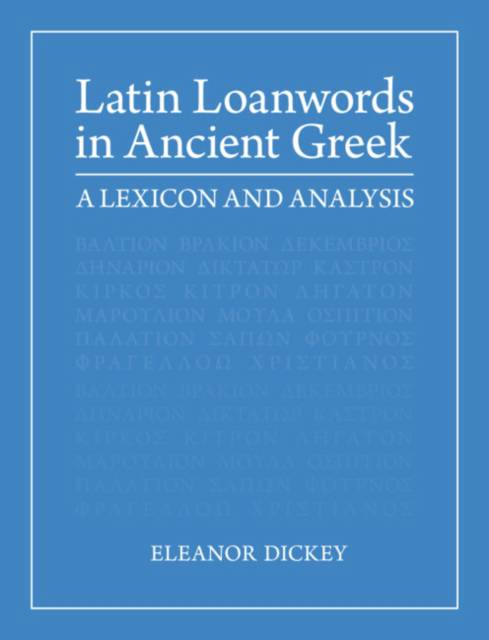
Je cadeautjes zeker op tijd in huis hebben voor de feestdagen? Kom langs in onze winkels en vind het perfecte geschenk!
- Afhalen na 1 uur in een winkel met voorraad
- Gratis thuislevering in België vanaf € 30
- Ruim aanbod met 7 miljoen producten
Je cadeautjes zeker op tijd in huis hebben voor de feestdagen? Kom langs in onze winkels en vind het perfecte geschenk!
- Afhalen na 1 uur in een winkel met voorraad
- Gratis thuislevering in België vanaf € 30
- Ruim aanbod met 7 miljoen producten
Zoeken
€ 314,45
+ 628 punten
Omschrijving
Why, when, and how did speakers of ancient Greek borrow words from Latin? Which words did they borrow? Who used Latin loanwords, and how? Who avoided them, and why? How many words were borrowed, and what kind of word? How long did the loanwords survive? Until now, attempts to answer such questions have been based on incomplete and often misleading evidence, but this study offers the first comprehensive collection of evidence from papyri, inscriptions, and literature from the fifth century BC to the sixth century AD. That collection - included in the book as a lexicon of Latin loanwords - is examined using insights from linguistic work on modern languages to provide new answers that often differ strikingly from earlier ones. The analysis is accessibly presented, and the lexicon offers a firm foundation for future work in this area.
Specificaties
Betrokkenen
- Auteur(s):
- Uitgeverij:
Inhoud
- Aantal bladzijden:
- 700
- Taal:
- Engels
Eigenschappen
- Productcode (EAN):
- 9781108841009
- Verschijningsdatum:
- 15/06/2023
- Uitvoering:
- Hardcover
- Formaat:
- Genaaid
- Afmetingen:
- 218 mm x 280 mm
- Gewicht:
- 2018 g

Alleen bij Standaard Boekhandel
+ 628 punten op je klantenkaart van Standaard Boekhandel
Beoordelingen
We publiceren alleen reviews die voldoen aan de voorwaarden voor reviews. Bekijk onze voorwaarden voor reviews.









